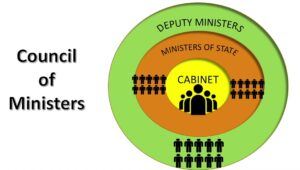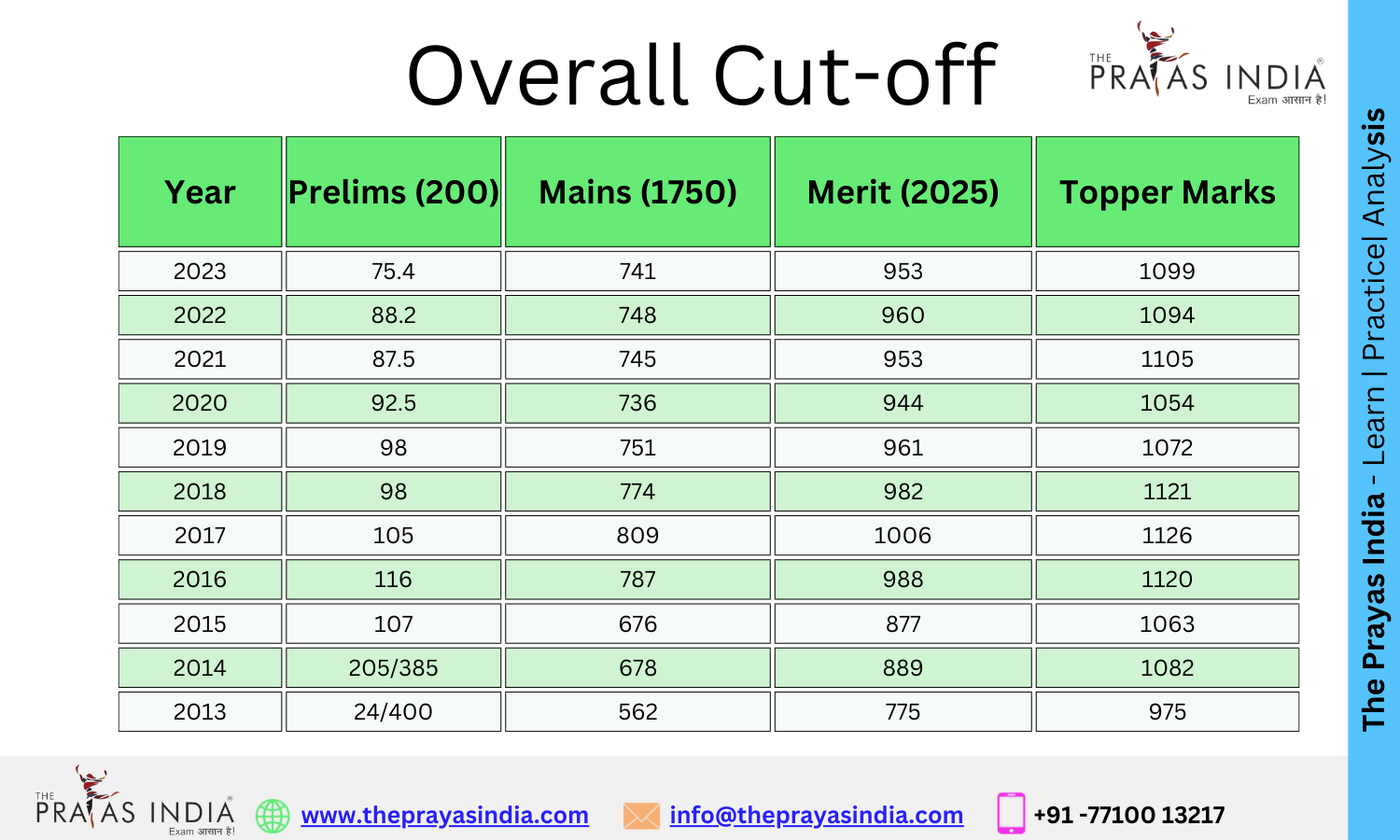Central Council of Ministers
The constitution of India provided for a parliamentary system of government which was adopted from the British pattern. Article 74 of the constitution of India provides for the Council of Ministers headed by Prime Minister to aid and advice the president. An article 75 deals with the appointment,tenure, responsibility, qualification, oath and salaries, and allowances of the ministers.
Important articles related to the Central Council of Ministers:
| Article | Provision |
| Article 74 | Council of Ministers to aid and advise the President |
| Article 75 | Other provisions as to ministers |
| Article 77 | Conduct of business of the Government of India |
| Article 78 | Duties of Prime Minister as respects the furnishing of information to the President, etc. |
Constitutional provisions:
Article 74: Council of Ministers to aid and advice the president
- There shall be a Council of Ministers with the Prime Minister at the head to aid and advise the president, who shall in exercise of his functions, act in accordance with such advice.
- Provided that the president may require the Council of Ministers to reconsider such advice either generally or otherwise and the president shall act in accordance with the advice tendered after such reconsideration.
- the 42nd constitutional amendment act 1976 made the aid and advice of Council of Ministers binding on president.
2. The question whether any and if So what advice was tendered by ministers to the presidential not be inquired into in any court.
Article 75: other provisions as to ministers
- The Prime Minister shall be appointed by the president and the other ministers shall be appointed by the president on the advice of the Prime Minister.
- The total number of ministers including the Prime Minister in the Council of Ministers shall not exceed 15% of the total number of members of the House of the people.
- The upper limit to councillor from ministers was introduced by 91st constitutional amendment act, 2003.
- The upper limit to the strength of Council of Ministers at the union has to be 15% of the strength of Lok Sabha and for the state legislative assembly the strength was also set to 15% only. and for the union territory which consists of a legislative assembly the upper limit is to be 10% of total strength of the legislative assembly. but in case of puducherry there is no upper limit.
- There is no lower limit at centre while there is a lower limit in state that is 12.
3. A member of either House of parliament belonging to any political party who is disqualified for being a member of that house under paragraph 2 of the 10th schedule shall also be disqualified to remember as a minister under clause (1) for duration of the period commencing from the date of his disqualification till the date on which the term of his office as such member would expire or where he contests any election to either House of parliament before the expiry of such period, till the date on which he is declared elected whichever is earlier.
- Anti defection law – If a if a member of parliament is disqualified under anti defection law then he cannot be made a minister for remainder of the term except if this member disqualified, is re elected to any of the house, then he can be made a minister post his re election.
4. The ministers shall hold office during the pleasure of the president
5. The Council of Ministers shall be collectively responsible to the House of the people
6. Before a minister enters upon his office, the president shall administer to him the oaths of office and of secrecy according to the forms set out for the purpose in the 3rd schedule
7. A minister who for any period of six consecutive months is not a member of either House of parliament shell at the expiration of that period cease to be administered.
8. The salaries and elements of ministers shall be such as parliament may from time to time by law determine and, until parliament so determines, shall be as specified in the 2nd schedule.
Article 77: conduct of business of the Government of India
- All executive action of the Government of India shall be expressed to be taken in the name of the president.
- Orders and other instruments made and executed in the name of the president shall be authenticated in such manner as may be specified in rules to be made by the president, and the validity of an order or instrument which is so authenticated shall not be called in question on the ground that it is not an order or instrument made or executed by the president.
- The president shall make rules for the more convenient transaction of the business of the Government of India, and for the allocation among ministers of the said business.
Nature of advice by ministers
- The 42nd and 44th constitutional amendment acts made the advice binding on the president. also the advice tendered by ministers to the president cannot be inquired by any court. this ensures the confidential relationship between the president and the ministers.
- Any exercise of executive power without the aid and advice of the Council of Ministers will be unconstitutional as being violative of article 74.
Qualification:
The minister must be a member of either House of parliament. if a person who is not a member of either House of parliament is appointed as minister he shall cease to be administered after six months, unless in the mean while, he manages to get elected or nominated to either House of the parliament.
Oath and Salary of ministers
The oath of office and secrecy of the ministers is administered by the president. The ministers in his oath of office swears
- to bear true faith and allegience to the constitution of India
- to uphold the sovereignty and integrity of India
- to faithfully and consciously discharge the duties of his office
- to do right to all manner of people in accordance with the constitution and the law without fear or favour, affection or illwill.
The minister swears in his oath of secrecy that he will not directly or indirectly communicate or reveal to any person any matter that is brought under his consideration or becomes known to him as a union minister except as may be required for the do discharge of his duties as such minister.
The salaries and allowances of ministers are determined by parliament from time to time and a minister gets the salary and elements that are payable to a member of parliament. in addition to it each minister gets a sumptuary allowance at a varying scale according to the rank and residence, free of rent etc.
Composition of Council of Ministers
- The constitution does not provide for the composition of the Council of Ministers.
- It only provides for an upper limit to the strength of Council of Ministers which is 15 person for centre and States and is 10% for union territories which have legislative assemblies except for puducherry, where there is no upper limit
- It is the Prime Minister who decides the composition and who gets what (portfolio).
- The ministers are divided into 3 categories: cabinet ministers, ministers of state (further divided into independent and non independent) and deputy ministers.

- Cabinet Ministers: The cabinet ministers are experienced ministers who hold important portfolios like home, finance, defence, agriculture, foreign affairs, etc. There number varies from time to time, but it is generally in the range of 15 to 20. a cabinet minister always heads a ministry and is given independent charge of it unless, he’s appointed a minister without portfolio. He attends the meetings of the cabinet on his own right. he is generally assisted by a minister of state or a deputy minister or both.
- Minister of state: The minister of state may be given independent charge of a ministry but generally he assists a cabinet minister in running ministry. A minister of the state cannot attend the meeting of the cabinet on his own right but can attend if invited. he is normally invited then given independent charge of a ministry. they are expected to prove their worth, talent and integrity. in course of time, they may be given a berth in cabinet.
- Deputy minister: A Deputy Minister is a junior member of the Council of Ministers and not given independent charge of any department. he is put under the charge of either minister of the cabinet rank or that of the minister of state so that he gets proper training. he does not attend cabinet meetings.
| Council of Ministers | Do they participate in Cabinet meeting? |
| Cabinet Ministers | Yes |
| Minister of State (independent & non-independent) | Only when invited |
| Deputy Minister | No |
Responsibility of ministers:
Article 75 clearly states that the Council of Ministers is collectively responsible to the Lok Sabha.
| Collective Responsibility | Individual Responsibility | Legal Responsibility |
|
|
|
The Cabinet
The Council of Ministers usually being a large body comprising of a number of ministers of various ranks seldom meets. But it is the smaller inner body within the Council of Ministers and it is the effective policy making organ of the council. it consists of the principle ministers on whom rests the real responsibility of formulating policies. That is why it has been varyingly described as a ‘wheel within a wheel’. the Council of Ministers as a whole never meets formally. it is to be noted that even though this system of government is widely known as the cabinet system of government the original constitution did not specifically mention the word cabinet anywhere. article 74 of the constitution provides only the Council of Ministers and makes no mention of cabinet. it was through the 44th constitutional amendment act 1978 that the word cabinet was used under article 352. but it has not been defined anywhere and it is based on the understanding and conventions of Britain. all members of the Council of Ministers are not members of the cabinet. its composition is flexible. it is for the Prime Minister to determine from time to time the composition of the cabinet, though due to the relative importance of certain departments, their ministers are invariably its members. the cabinet ministers are members of the cabinet, while a minister of state may attend a cabinet meeting when matters pertaining to his department are to be discussed. Cabinet decides major questions of policy. its decisions are binding on all ministers. the various government departments carry out the cabinet’s policy decisions by administering the law and devising measures for enactment as law by parliament. it is the central directing instrument of government in legislation as well as in administration. it coordinates administrative action and sanctions legislative proposals. it is the cabinet which controls parliament and governs the country. the primary functions of the government are to formulate the policies of the government for the good governance of the country, haven’t accepted by the legislature and carry on the executive function of the state as per the constitution and the laws. Subject to the cabinet enjoying majority support in the house, no other authority is as powerful as the cabinet. with regard, to the position of the cabinet, it enjoys a predominant position in the administration. it is an efficient part of the government.
Difference between Council of Ministers and cabinet:
| It is a wider body consisting of 60 to 70 ministers. | It is a smaller body consisting of 15 to 20 Ministers. |
| It includes all the three categories of ministers, Cabinet Ministers, Ministers of State and Deputy Ministers. | It includes the cabinet i.e. Ministers only. Thus, it is a part of the Council of ministers. |
| It does not meet, as a body, to transact government business, It has no collective functions.
|
It meets as a body frequently and usually once in a week, to deliberate and take decisions regarding the transaction of the government business. Thus, it has collective functions. |
| It is vested with all powers. but in theory. | It exercises, in practice, the power of the Council of Ministers and thus acts for the latter. |
| Its functions are determined by the Cabinet.
|
It directs the Council of Ministers by taking policy decisions which are binding on all ministers. |
| It implements the decisions taken by the Cabinet. | It supervises the implementation of its decisions by the Council of Ministers. |
| It is a constitutional body, dealt in detail by the Articles 74 and 75 of the Constitution, Its size is determined by the Prime Minister according to the exigencies of the time, and the requirements to the situation. Its classification now into a three-tier body, and is based on the conventions to the parliamentary form of government as developed in Britain. It has however, got a legislative sanction. Thus, the Salaries and Allowances Act of 1952 defines a ‘Minister’ as a “Member of the Council of Minister”, by whatever name called and includes a Deputy Minister. | The word ‘cabinet’ was inserted in the Article 352 of the Constitution in 1978 by the 44th Constitutional Amendment Act. Thus, it did ot find a place in the original text of the Constitution. Even, Article 352 defines the cabinet saying that, it is “the council consisting the Prime Minister and other Ministers of Cabinet rank appointed under Article 75? and does not describes its powers and functions. In other words, its role in our politico-administrative system is based on the conventions of the parliamentary form of government as developed in Britain. |
| It is collectively responsible to the Lower House of the Parliament. | It enforces the collective responsibility of the Council of Ministers to the Lower House of the Parliament. |
Different types of Cabinet:
| Cabinet | Kitchen Cabinet | Shadow Cabinet | |
| Source | The term cabinet was inserted in the Constitution by 44th Constitutional Amendment Act, 1978 (inserted under article 352 as per which National Emergency can be proclaimed only on written advice of Cabinet | It is an informal term not mentioned in constitution, law or rules. | Continued in UK but it is not in India |
| Functions | Cabinet is the most important executive decision making body.
It functions through the Cabinet Meetings. |
Informal body that assist the PM in decision making.
Individuals close to the Prime Minister, that is, Cabinet Minister or relatives. |
Plays an important role in effectiveness of Parliamentary form of government.
Leader of opposition appoints members from the opposition parties in the shadow cabinet and the shadow cabinet mirrors thee working or functioning of the Cabinet. |



![Prayas-लक्ष्य [UPSC CSE Target] The Prayas India](https://theprayasindia.com/wp-content/uploads/2021/08/Prayas-लक्ष्य-UPSC-CSE-Target-The-Prayas-India-300x167.png)

![Prayas Pre-भेदश [UPSC CSE Prelims Test Series] The Prayas India](https://theprayasindia.com/wp-content/uploads/2021/08/Prayas-Pre-भेदश-UPSC-CSE-Prelims-Test-Series-The-Prayas-India-300x167.png)










